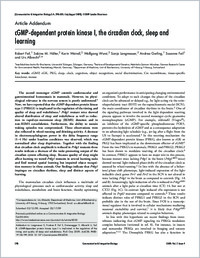cGMP-dependent protein kinase I, the circadian clock, sleep, and learning
- Feil, Robert Interfakultäres Institut für Biochemie, Universität Tübingen, Tübingen, Germany
- Hölter, Sabine M. Institute of Developmental Genetics, Helmholtz Zentrum München, German Research Center for Environmental Health, Neuherberg/Munich, Germany
- Weindl, Karin Institute of Developmental Genetics, Helmholtz Zentrum München, German Research Center for Environmental Health, Neuherberg/Munich, Germany
- Wurst, Wolfgang Institute of Developmental Genetics, Helmholtz Zentrum München, German Research Center for Environmental Health, Neuherberg/Munich, Germany
- Langmesser, Sonja Division of Biochemistry, Department of Medicine, University of Fribourg, Switzerland
- Gerling, Andrea Interfakultäres Institut für Biochemie, Universität Tübingen, Tübingen, Germany
- Feil, Susanne Interfakultäres Institut für Biochemie, Universität Tübingen, Tübingen, Germany
- Albrecht, Urs Division of Biochemistry, Department of Medicine, University of Fribourg, Switzerland
-
2009
Published in:
- Communicative & Integrative Biology. - 2009, vol. 2, no. 4, p. 298 - 301
English
The second messenger cGMP controls cardiovascular and gastrointestinal homeostasis in mammals. However, its physiological relevance in the nervous system is poorly understood. Now, we have reported that the cGMP-dependent protein kinase type I (PRKG1) is implicated in the regulation of the timing and quality of sleep and wakefulness. Prkg1 mutant mice showed altered distribution of sleep and wakefulness as well as reduction in rapid-eye-movement sleep (REMS) duration and in non-REMS consolidation. Furthermore, the ability to sustain waking episodes was compromised. These observations were also reflected in wheel-running and drinking activity. A decrease in electroencephalogram power in the delta frequency range (1–4 Hz) under baseline conditions was observed, which was normalized after sleep deprivation. Together with the finding that circadian clock amplitude is reduced in Prkg1 mutants these results indicate a decrease of the wake-promoting output of the circadian system affecting sleep. Because quality of sleep might affect learning we tested Prkg1 mutants in several learning tasks and find normal spatial learning but impaired object recognition memory in these animals. Our findings indicate that Prkg1 impinges on circadian rhythms, sleep and distinct aspects of learning.
- Faculty
- Faculté des sciences et de médecine
- Department
- Département de Biologie
- Language
-
- English
- Classification
- Biology, life sciences
- License
-
License undefined
- Identifiers
-
- RERO DOC 13048
- DOI 10.4161/cib.2.4.8220
- Persistent URL
- https://folia.unifr.ch/unifr/documents/301292
Statistics
Document views: 113
File downloads:
- pdf: 160
